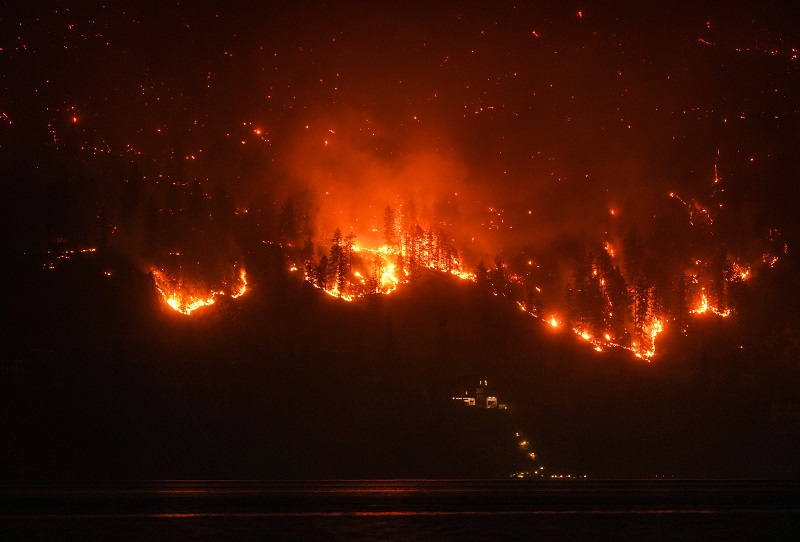Wildfire damage projected to increase in Canada

A repeat of Canada’s unprecedented wildfire season last year will become over six times more likely by 2100, an inaugural State of Wildfires 2023-24 report shows.
At least, that’s the trajectory if no action is taken to tackle greenhouse gas emissions, according to the research, published in the Earth System Science Data journal.
That would mean a Canadian born in this decade, and who lives to age 83, would almost certainly see a wildfire season similar to 2023’s at least once (65% to 90% chance) in their lifetime, and possibly even twice (48% to 84% chance).
Comparatively, a Canadian who reached age 83 before the end of the 2010s only had a 12% chance of seeing a fire season as bad as 2023’s during their lifetime.
However, under a low emissions scenario, Canada could instead see the likelihood of extreme fire seasons increase just two-fold by 2100.
“Whatever emissions scenario we follow, risks of extreme wildfires will increase in Canada, highlighting that society must not only cut emissions but also adapt to changing wildfire risks,” says Douglas Kelley, a land surface modeller and one of the researchers of the report.
Fire, fire, everywhere
Climate change made last year’s unprecedented wildfire season three times more likely. And that burn season, “contributed to high levels of CO2 emissions from burning globally,” the release from the University of East Anglia reads.
In 2023, over 6,623 wildfires burned 18.4 million hectares of land during wildfire season, according to reporting by Natural Resources Canada.
This was a national — and global — anomaly of burned area and fire carbon emissions, the researchers find.
Emissions from Canadian fires were over nine times the average of the past two decades and contributed almost a quarter of last year’s total (8.6 billion tonnes) global emissions.
For comparison, the ten-year average number of wildfires across Canada is 4,394, for just over 3 million hectares burned each year.
Currently, there are 4,246 wildfires burning across Canada. And wildfires have so far burned more than 2.9 million hectares as of last week.
Peak anomalies in last year’s wildfire season happened in June for eastern Canada, and August to September for western Canada, the research notes.
Plus last year, “over 232 000 people were evacuated in Canada alone, highlighting the severity of human impact,” the researchers write. (And that doesn’t include the business interruption impact that insurers felt).
Last year, anomalies in burned areas were 40% higher due to climate change in Canada, the new analyses shows.
And, the authors say, human-driven climate change means the likelihood of high fire weather increased by 2.9 to 3.6 times. “By the end of the century, events of similar magnitude to 2023 in Canada are projected to occur 6.3 [to] 10.8 times more frequently under a medium–high emission scenario.”
How this season could shake out
The researchers’ seasonal outlook for 2024 shows ‘moderate’ fire season anomalies would have peaked in early summer. “This combined with overwintering fires could promote a second consecutive high fire season,” it says.
With this year’s area burned already approaching the seasonal 10-year average, Canada will once again surpass it. But by how much remains to be seen, and because wildfire season ends in October, fires could burn for longer.
Ongoing fires are affecting British Columbia, with more than 400 active wildfires, and Alberta, with 126 active fires.
The researchers note hot, dry and windy conditions that are prevalent in North America create particularly favourable wildfire conditions in those western provinces.
But Natural Resources Canada indicates extreme, out-of-control fires are also burning through the territories and the prairies.
Forecasting for fire risk is still a growing area of research. In 2023, early indications of extreme fire weather in Canada were predicted two months in advance.
The McDougall Creek wildfire burns on the mountainside above a lakefront home, in West Kelowna, B.C., on Friday, August 18, 2023. THE CANADIAN PRESS/Darryl Dyck







